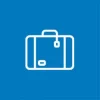Are you a digital nomad, or are you thinking of making a change and adopting the nomad lifestyle? The high cost of living may drive many Swiss digital nomads to spend time in cheaper locations. But these tips from moneyland.ch can help you get more out of your mobile lifestyle both in Switzerland and beyond.
1. Telecommunications
In Switzerland, a mobile Internet plan will keep you connected at reasonable speeds in most parts of the country. If you travel abroad, then mobile roaming is important as well. You can easily find the right solution for your specific mobile Internet and phone call needs at the best price using the comprehensive moneyland.ch mobile plan comparison. For longer stays or if you visit the same countries often, using local SIMs is a good alternative to roaming.
2. Social security and taxes
If you keep your main residence in Switzerland and continue to work for a Swiss employer, then social security and taxes should not be a problem. Your social security and pension fund contributions are managed by your employer, or by you if you are self-employed. You continue to submit annual tax returns or (as a temporary resident) pay withholding tax directly from your salary.
Rules for keeping your residence in Switzerland vary between cantons, so asking your municipal office about the requirements for remaining a resident is recommended.
The laws of the countries you will be visiting also affect your residence status. While exact rules vary between countries, many countries consider you a tax resident when you live in them more than 6 out 12 consecutive months. If you stay in a foreign country for an extended period, you could be required to meet tax and social security obligations in that country. Whether or not you work while staying in a country can also impact your tax and social security obligations. The Work From Anywhere website provides a good overview of tax rules for remote workers.
If you spend the bulk of your time outside of Switzerland, things become a little more complicated. This is especially true if you, as a Swiss or EU citizen, stay in countries with which Switzerland has bilateral social security agreements. For example, within EFTA or the EU, you are generally required to subscribe to social security in the country you live in. But if you do more than 75 percent of your work in a different country, then you are subject to social security in that country. This applies whether you are employed or self-employed. Even if you keep your residence in Switzerland, you may lose your right to Swiss social security and have to join social security schemes in the country which most of your work is done in.
Rules for other countries vary, and whether or not you are Swiss also plays a role. You can download an OASI guide which explains the exact rules for each situation here (German PDF).
Read the financial guide to leaving Switzerland if you plan to give up residence in Switzerland and move to other countries for longer periods of time. If you will be moving to a neighboring country but will keep working for Swiss employers, take a look at the financial guide for cross-border workers.
3. Health insurance
Living a mobile lifestyle generally means making use of doctors and healthcare facilities in many different places rather than having a fixed general practitioner and specialists. Using a telemedicine model for your compulsory health insurance makes more sense than using the family doctor or HMO models.
Some health insurance companies have additional limitations, such as requiring you to use specific specialists or healthcare facilities even after your initial consultation with the telemedicine center. Make sure to use a telmed offer which offers free choice of doctors after the initial consultation.
If you keep your primary residence in Switzerland, you can remain insured by Swiss health insurance in spite of frequent travel. If your nomadic lifestyle tends to take you outside of Switzerland, it is important to understand how you are covered abroad. You can find useful information in the guide to Swiss health insurance for travelers, and the guide to Swiss health insurance coverage for medical treatments abroad.
4. Banking
Nearly all Swiss banks offer online banking and most also have mobile apps, so managing your money while on your walkabouts is hardly an issue. Things you will want to look into are credit card foreign transaction fees, currency exchange rates, and costs for withdrawing money abroad using debit cards. Some neobanks do not charge foreign transaction fees for transactions in a number of currencies. They often have much better currency exchange rates than conventional banks and credit card issuers as well.
5. Permanent accommodation
Having a permanent address is useful, and is generally required if you want to keep your Swiss tax residence, insurances, bank accounts, and subscriptions. Cities like Basel, Geneva, and Zurich offer good infrastructure, leisure and networking opportunities, but housing is generally more affordable in rural areas.
If you rent a home, but will spend a great deal of time away, you could consider subletting rooms to other people to help cover your costs. Alternatively, you can also quit your rental home and sub-rent a room in a shared apartment yourself. You can easily find rooms to rent on websites like Homegate, Flatfox and Urban Home. It is also worth considering whether you have a close friend or family member who will let you move in at their address, possibly free of charge or for a very low rent.
6. Temporary accommodation
Using online home sharing platforms like Airbnb and Homestay is the easiest way to find places to stay in Switzerland or abroad for anywhere from a day or two to several months. Unlike standard rental contracts, you are not bound to long rental terms or notice periods. Rooms in private residences and holiday homes are available from as little as 600 to 800 francs per month.
Hotels are always an option for short stays, and following these saving tips for Swiss hotel stays can help you get more hotel stays for your money.
Coliving is a new take on classic shared housing concepts which combines living and working spaces. Some coliving providers offer subscriptions which entitle you to unlimited stays at one or multiple locations over the subscription term. You can find coliving offers using search engines, and on websites like coliving.com and colivingswitzerland.ch.
If you are adventurous, social, or thrifty, home sharing communities like Bewelcome, Couchsurfers, and Trustroots could work well for you. All of these have numerous members across Switzerland and many other countries who host other members free of charge. They also provide a great platform for expanding your base of friends and contacts.
Work exchanges are an option if you are looking for variety in your work life, want to see the world and expand your social circle, and – most importantly – are willing to work for room and board. Platforms like workaway.info, worldpackers.com, helpx.net and many more offer numerous work-for-board opportunities in Switzerland and around the world.
7. Travel
Aside from being able to take advantage of off-season travel deals, having an international perspective also gives nomads an edge on finding the best value for money. Take a look at these tips for saving on flights, maximizing frequent flier programs, earning complimentary flights with credit cards and claiming your airline passenger rights for ideas on how to get the most out of getting around.
The Internet is pockmarked with travel blogs and guides which can serve as a great inspiration for travel. Websites like Swiss travel blog aggregator Traveliki (German content) make finding relevant blog posts a breeze.
Digital nomad travel programs like Remote Year, Unsettled, and many more combine coliving and coworking with travel and experiences. These are often much cheaper than conventional travel packages. They are worth considering if you are not looking for luxury and enjoy hanging out with like-minded people while seeing the world.
For creatures of comfort, cruises not only give you travel, accommodation, and some level of Internet access, but also interesting opportunities to meet people. Off-season prices are often remarkably low. In some cases cruising the seas in luxury can cost you less than your basic living expenses in Switzerland for the same period. Cruises targeting digital nomads, such as those offered by Nomad Cruise, are a relatively new phenomenon which combine conventional cruises with networking events and workshops.
8. Coworking
For many nomads, a laptop and a phone is more or less the sum total of their home office. Many Swiss cafes cater specifically to remote workers, offering free Internet and not pressuring you to make purchases. Some Swiss banks – including the Basler Kantonalbank, Credit Suisse and the Zürcher Kantonalbank – offer free coworking spaces to their customers at some branch offices. Many airport lounges also offer workspace and conference facilities which you can use when traveling internationally (if you get complimentary airport lounge access with your credit card, for example).
The Swiss coworking sector is somewhat fragmented. There are many providers, most of which operate just a few locations. Even different spaces from the same provider often require separate memberships and have their own fees. For this reason, it is important to carefully consider which locations you are likely to work in before paying for a membership. Avoid providers with long contract terms and notice periods.
If you only occasionally need the use of a coworking space, paying for a day pass may be cheaper than getting a membership. There are also international coworking passes (like the Global Pass from Coworker) which give you access to your choice of numerous partner coworking spaces in Switzerland and around the world, for a limited number of days per month. These can offer good value compared to getting individual day passes.
9. Transportation
If most of your travel is in Switzerland and neighboring countries, owning a car is sometimes the most affordable option. Check out these saving tips for car owners for advice on how to avoid unnecessary costs.
Car plans and long-term rentals are a low-commitment alternative to owning a car. You can use the Swiss car plan comparison on moneyland.ch to get a good overview of service providers and costs.
Swiss public transportation is relatively expensive, but it does provide a flexible means of traveling to almost every part of the country. Booking tickets well ahead of time and online can drastically cut the cost of using public transportation in Switzerland.
If you cannot drive or want to keep costs to a minimum, there are numerous other ways to get around in Switzerland.
10. Networking
Apart from the usual networking related to your work, such as industry conferences and online networking, there are also many options for networking with other digital nomads. The Digital Nomads Switzerland Association, for example, hosts annual digital nomad conferences in Switzerland. Digital nomad communities on social media also organize meetups.
For socializing outside of the digital nomad zone, apps like Meetup make it easy to connect with special interest groups in many different locations and make new friends.
11. Fitness
If you are in the habit of exercising at gyms, make sure to use a plan which gives you access to gyms around the country. In addition to the big gym operators with a countrywide presence, there are also plans like the one offered by Fitpass which let you use many different gyms and sports facilities across Switzerland. It is worth noting that some Swiss supplemental health insurances contribute to Swiss gym memberships.
Free-to-use sports and recreation facilities like vita parcours and football fields are available right across Switzerland and in many other countries. If you enjoy using workout videos, you can find countless options on video streaming platforms like YouTube and Dailymotion.
12. Food
Eating well in Switzerland does not have to be expensive. This is especially true if you have access to a kitchen and can prepare your own meals. Check out the moneyland.ch guides to saving at Swiss supermarkets and buying groceries online in Switzerland for useful information and saving tips.
Dining out in Switzerland is not cheap compared to many other countries, but the cost is compensated by the relatively wide variety of culinary experiences available. You can find ideas for how to get more restaurant dining for your money in this guide.
More on this topic:
Compare Swiss travel insurance now
Financial checklist when leaving Switzerland

 Deal of the Day
Deal of the Day 










